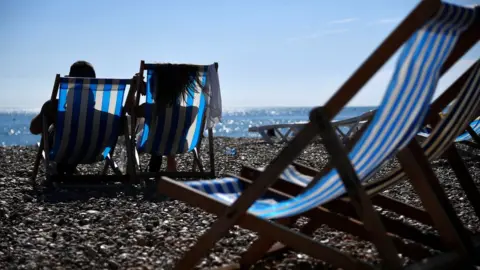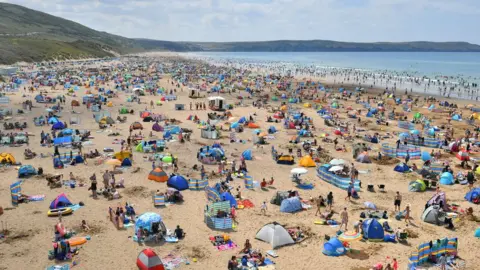Warmer weather could last until October, Met Office says
 Reuters
ReutersThe UK's warmer than average weather could last until October, the Met Office says.
In a briefing for local authorities it says above-average temperatures are more likely than below-average temperatures for the next three months.
Fresher, cooler temperatures are expected from the middle of this week, lasting throughout the weekend.
But the Met Office analysis suggests warm, dry conditions could return and continue into the autumn.
The three-month outlook shows an increased chance of stable weather conditions, bringing warmer than average temperatures and below-average rainfall.
However the increase could be just one or two degrees above average temperatures - which are 19C, 16C and 13C for August, September and October respectively.
A Met Office spokesperson stressed the outlook gave a "general trend" for the period rather than a "detailed forecast".
"We need to remember that this is an average for the whole of the UK over a three-month period and so there will be variations in weather from day to day and week to week, over the whole of the UK," they said.
"Although temperatures are more likely to be warmer than average over the three months, this doesn't mean wall-to-wall sunshine, it can still be warm and cloudy."
In the short term temperatures are set to top 30C in some parts of the UK on Monday.
On Tuesday temperatures could peak at 34C in Essex or Norfolk, the Met Office said.
However much of Scotland and Northern Ireland will start the week with some rain.
And maximum temperatures are likely to dip to around the mid-20s by Wednesday.

Forecaster Dean Hall said there will be "quite a marked change to the feel of things" from the middle of the week as conditions turn "fresher and more changeable".
It is likely to stay cooler throughout next weekend, he said, with "no real sign of any return of the heat that we have been seeing over the recent days".
 Press Association
Press Association  Press Association
Press AssociationIt comes amid a sweltering European heatwave, with Portugal and Spain being hit by the hottest temperatures.
British holidaymakers are being warned to avoid spending time in the sun during the hottest part of the day and to keep hydrated.
Last week local records were smashed in eight areas of Portugal, while Lisbon broke a 37-year-old record with temperatures reaching 44C on Sunday.
Red health alerts for extreme heat have been issued for more than half the country and hot, dry conditions have led to several wildfires.
 EPA
EPAIn Spain, heat warnings were issued for 41 of the country's 50 provinces.
The conditions played a part in the deaths of two men, one in Barcelona and the other in the southern region of Murcia, according to Spanish authorities.
 AFP/Getty Images
AFP/Getty Images
Coping in extreme heat
By David Shukman, BBC science editor
Extreme heat is a challenge for millions of people in large parts of the world.
Of course it can be a blessing for anyone on holiday. And it's certainly easier to tolerate if buildings are designed to cope with high temperatures - with Mediterranean-style shutters and deep balconies and bright reflective walls.
But for the elderly and the very young and for people who have to work outside, such as construction workers and farmers, finding respite can be difficult.
The obvious solution is air conditioning. The former leader of sweltering Singapore once said aircon was the key to his country's remarkable success.
But chilling a room involves displacing the heat - it has to go somewhere, and that means boosting temperatures outdoors.
In a city, already warmer than the surrounding countryside, it's like turning up an oven.
For climate scientists, none of this is a big surprise. As far back as 1990, a UN panel warned that global warming would mean more extremes of heat of the kind we're seeing right now.
